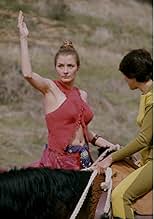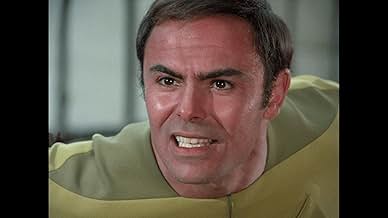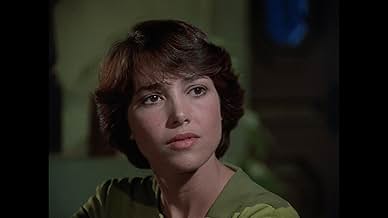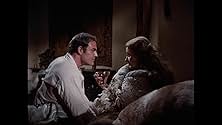Ajouter une intrigue dans votre langueA man awakens from suspended animation and finds himself in the 22nd century, where women rule the world and men are slaves called Dinks. He is captured and sold as a slave, but escapes and ... Tout lireA man awakens from suspended animation and finds himself in the 22nd century, where women rule the world and men are slaves called Dinks. He is captured and sold as a slave, but escapes and hooks up with a male rebel movement.A man awakens from suspended animation and finds himself in the 22nd century, where women rule the world and men are slaves called Dinks. He is captured and sold as a slave, but escapes and hooks up with a male rebel movement.
Jo de Winter
- Villar
- (as Johana De Winter)
Corinne Camacho
- Bronta
- (as Corrine Camacho)
Sue Dahlman
- Thetis
- (as Sara Chattin)
Robert Sutton
- Kreeg Captain
- (as Raymond Sutton)
Histoire
Le saviez-vous
- AnecdotesThe plot was based on a story premise for 'Genesis II' called "The Poodle Shop", which was in turn based on an unused story idea ("The Pet Shop") in Gene Roddenberry's original pitch for Patrouille du cosmos (1966).
- ConnexionsFollows Genesis II (1973)
Commentaire en vedette
This is a tough-minded and quite intelligent script, by Juanita Bartlett and Gene Roddenberry. It is, as those who have seen "Genesis II" and an inferior sequel know, the second attempt to create a pilot film that would sell as a television series. It might be instructive I suggest to study the primary changes made from the first to the second attempt; this one was written not as an original concept but from a story treatment called "Poodle Shop" that was one of more than a dozen developed by Gene Roddenberry, when he had hoped "Genesis II" might be picked up by a network's 'tsars' under its unarguably better title. First, we have John Saxon a suspended-in-cryogenics 20th century scientist Dlan Hunt instead of Alex Cord, an improvement in accent and general acting. Second, we start with Hunt in the 22nd century, not in his own time. Third, he is here a member of a Pax City team, one of many that comb the world from their southwestern location in North America discovering what changes a 150-plus year period has made after a devastating nuclear conflict altered the lives of the planet's peoples. Ecologically, the world has been given a second chance; but there are strange peoples, tribes and cities everywhere. Fourth, he is accepting from the beginning the idea championed by Pax not to use force for its ends, a notion which he did not buy in the first script. And fifth, the aristocratic aliens of the city of Tyrania have been replaced as villains in this feature by Kriegs, aliens with a raised skull ridge whose mutation leads them to be warlike, not very bright and just smart enough to run wood-burning war-vehicles, cars kept running somehow, for their purposes of enslaving everyone they meet. The story-line involves Pater (formerly "Primus" in the first film) Kimbridge being grievously injured during a Krieg attack away from Pax. The Team tries to get him away by diverting the Kriegs, but by the time they get him into sub-shuttle tunnels and back to Pax, he is beyond all but the best medical help. Since he is Pax's leader, Hunt takes the team, consisting of a giant white Indian, a skinny blond cockney and a young female unisex worshiper of St. Freud in search of the doctor they need, who had been reported lost a long while ago in a nearby territory. They know only that it is a zone ruled by a matriarchy, so they plan to try to penetrate it several ways. Harper-Smythe, played by Janet Margolin plays her role by ear, asking to join the group and having to fight to defeat a challenger. Having done so, she is warmly welcomed into a home, where she finds men are slave-servants, kept in check emotionally by a special gruel that saps resolve when they ingest it. Hunt tries his own entry and with his men he is captured and tossed into a pen with other slaves, bossed over by lovely Johana De Winter as Villar. He is vended to Marg, the best warrior of the Confederacy of Ruth; and all the women slave-owners can talk about is that there is too-much resolve being removed from their males, "dinks", since no babies are being born. Hunt is fed the gruel and gets frightened; but he fights it with better results than others have, and learning what it is, he avoids a second dose. He also finds the missing doctor. He plays on Marg's pride by telling her of his fantastic prowess as a lover; angrily, she lets him come to her and show her his method--it is booze. They get closer and closer to the right moment of "balance", and when he is inebriated and ready--she has fallen asleep entirely. The next day, Harper-Smythe challenges Marg for her "dink", her slave, and defeats her. It is soon after that the Kriegs attack; Hunt and his team, the others also captured, fight, with Harper-Smythe's help. even the male slaves joining in. The old way it now seems will be altered in the Confederacy; and Marg invites Hunt to visit any time and finish the experiment. "On balanced terms?" he asks. "On any terms", she adds. Then they have rescued their medical man, so they take him back to Pax City. Will they be in time to save the Pater? There is little music, but what there is is good. The film was decently directed by Marc Daniels, who is better with actors than camera angles, a veteran of "Star Trek" assignments. Costumes were provided as in the first pilot by "Star Trek" costumer William Ware Theiss and they are very imaginative indeed. The very fine alien set decorations were the work of Edward Baer. Among the cast, Jo De Winter is superb, and Diana Muldaur very good as the fiery Marg. Others in the mix include Ted Cassidy as Isiah the white Indian, Christopher Cary as the new team member, Baylok, Sally Kemp as Treece, Harper-Smythe's hostess, Claire Brennan, Corinne Camacho, Majel Barrett as the new Pax Security Chief and Aron Kincaid and Jim Antonio in support. This is an interesting, often thoughtful attempt I assert to make a feature-length film of an intended series episode. The color in the effort is pretty, but perhaps it belonged in B/W as a drama; however, the unusual use of comedy in the sexually-charged portions works rather well because it is kept satirical. "Women's lib--or women's lib gone mad?" Hunt asks at one point. This entertaining and well-mounted story does a good job of presenting the women's reasons for suppressing males--who had all-but-destroyed the Earth with their wars. Their way, historically, seemed to be better; but as Hunt reminded the Confederacy's members, there are other ways to rule men than by drugging their food, for a real woman.
- silverscreen888
- 20 juill. 2005
- Lien permanent
Meilleurs choix
Connectez-vous pour évaluer et surveiller les recommandations personnalisées
Détails
Contribuer à cette page
Suggérer une modification ou ajouter du contenu manquant

Lacune principale
By what name was Planet Earth (1974) officially released in India in English?
Répondre


































